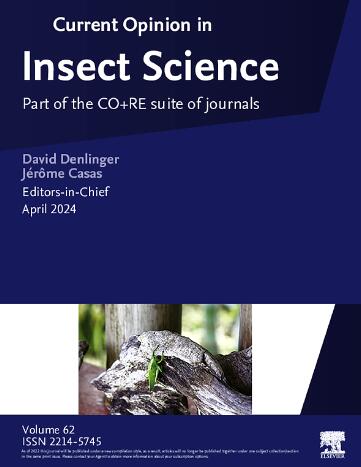Parasitoids as biocontrol agents in India
IF 4.8
1区 农林科学
Q1 BIOLOGY
引用次数: 0
Abstract
Amid concerns over chemical pesticide resistance and its associated environmental hazards, parasitoids offer an alternative long-term solution to manage insect pests in agriculture. India’s use of parasitoids in pest management has developed in tandem with the rest of the world, and this review summarizes the history of parasitoid-based biocontrol from the past to the present, focusing on problems such as climate adaptability, ecological compatibility, research-based advances, and policy-making. It focuses on successful classical, conservative, and augmentative techniques that form the foundation for implementing effective and sustainable biological control strategies involving parasitoids in India. The components that influence the efficiency of biocontrol activities, such as suitable phenological stages of parasitoids, field deployment techniques, quality assurance, environmental conditions, area-wide approaches, the need for sound habitat management, policy interventions, and public–private partnership are highlighted. Recent advancements in parasitoid mass production, quality control, and understanding competitive ecological interactions have provided prospects for designing effective parasitoid-centered biocontrol programs. The review presents historical breakthroughs in explaining how parasitoids help stabilize the agroecological dynamics that support sustainable food systems, primarily in India.
印度作为生物控制剂的寄生虫。
在人们对化学杀虫剂抗药性及其相关环境危害的担忧中,寄生虫为农业害虫管理提供了另一种长期解决方案。印度在害虫管理中使用寄生虫的情况与世界其他国家同步发展,本综述总结了从过去到现在以寄生虫为基础的生物防治的历史,重点关注气候适应性、生态兼容性、研究进展和政策制定等问题。报告重点介绍了成功的经典、保守和辅助技术,这些技术为在印度实施有效和可持续的寄生虫生物防治战略奠定了基础。重点介绍了影响生物防治活动效率的因素,如寄生虫的适宜物候期、实地部署技术、质量保证、环境条件、全区域方法、健全的生境管理需求、政策干预和公私伙伴关系。最近在寄生虫大规模生产、质量控制和了解竞争性生态相互作用方面取得的进展,为设计有效的以寄生虫为中心的生物控制计划提供了前景。综述介绍了在解释寄生虫如何帮助稳定支持可持续粮食系统的农业生态动态(主要在印度)方面取得的历史性突破。
本文章由计算机程序翻译,如有差异,请以英文原文为准。
求助全文
约1分钟内获得全文
求助全文
来源期刊

Current opinion in insect science
BIOLOGYECOLOGYENTOMOLOGY-ECOLOGY
CiteScore
10.40
自引率
1.90%
发文量
113
期刊介绍:
Current Opinion in Insect Science is a new systematic review journal that aims to provide specialists with a unique and educational platform to keep up–to–date with the expanding volume of information published in the field of Insect Science. As this is such a broad discipline, we have determined themed sections each of which is reviewed once a year.
The following 11 areas are covered by Current Opinion in Insect Science.
-Ecology
-Insect genomics
-Global Change Biology
-Molecular Physiology (Including Immunity)
-Pests and Resistance
-Parasites, Parasitoids and Biological Control
-Behavioural Ecology
-Development and Regulation
-Social Insects
-Neuroscience
-Vectors and Medical and Veterinary Entomology
There is also a section that changes every year to reflect hot topics in the field.
Section Editors, who are major authorities in their area, are appointed by the Editors of the journal. They divide their section into a number of topics, ensuring that the field is comprehensively covered and that all issues of current importance are emphasized. Section Editors commission articles from leading scientists on each topic that they have selected and the commissioned authors write short review articles in which they present recent developments in their subject, emphasizing the aspects that, in their opinion, are most important. In addition, they provide short annotations to the papers that they consider to be most interesting from all those published in their topic over the previous year.
 求助内容:
求助内容: 应助结果提醒方式:
应助结果提醒方式:


